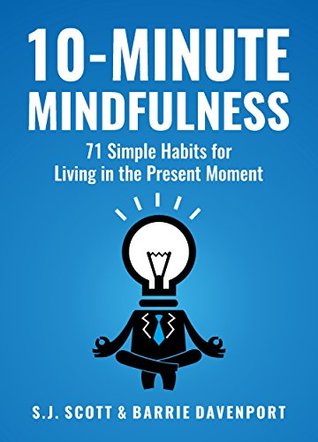More on this book
Community
Kindle Notes & Highlights
by
S.J. Scott
Read between
February 5 - February 15, 2018
Becoming more present doesn’t always mean you’ll form a habit from scratch. Instead, it often involves replacing an existing habit with a better version of the same habit.
described a concept known as ego depletion, which is a person’s “diminished capacity to regulate their thoughts, feelings, and actions.”
A mindfulness habit shouldn’t be based upon motivation, fads, or temporary desire. Rather, it should be instilled into your life to the point where the behavior becomes automatic.
My rule of thumb is to come up with a series of if-then statements for all the common challenges that occur in life.
Gratitude is a mindfulness habit that awakens us to the large and small blessings we experience every day—those we tend to overlook in the busyness of our hectic lives.
A mindful gratitude practice means immersing yourself in the emotion so that you feel deeply and profoundly blessed.
Performing a body scan also helps shift your attention away from your thoughts so that you become more grounded in your own physical presence.
“Breath is the bridge which connects life to consciousness, which unites your body to your thoughts.”
“When we drink a glass of water, and if we know that we are drinking a glass of water, if we’re concentrated on the fact that we are drinking water, mindfulness is already there. And the water drinking becomes deeper, truer, and real.”
“You are what your deepest desire is. As your desire is, so is your intention. As your intention is, so is your will. As your will is, so is your deed. As your deed is, so is your destiny.”
Remember that we tend to be less mindful with emails than we are with face-to-face communication. When you receive an email, try to visualize the human face behind the words, as it’s easy to misread a person’s intentions with email.
flow as “a state in which people are so involved in an activity that nothing else seems to matter; the experience is so enjoyable that people will continue to do it even at great cost, for the sheer sake of doing it.”
However, if we wait for outcomes before we experience joy, we rob ourselves of happiness and satisfaction. The real joy is in the doing rather than achieving the final result.
Just consider how starting your day in a negative state can have a negative impact on your work performance, not to mention your job satisfaction. In fact, research shows that bad moods lead to procrastination, while feelings of happiness increase both productivity and success.
They may notice stress, physical symptoms, or frustration, but they aren’t tuned in enough to consciously acknowledge their feelings or notice how their moods are impacting the quality of their work.
In the example above, the trap might be, “My boss must really think I’m a loser. He hates me.” To fix this, you could ask yourself, “Are my thoughts about this situation really true or the entire truth? What is a more positive or productive way of thinking about this situation? Does my boss actually hate me?”
“My boss wasn’t respectful in the meeting, but he has treated me respectfully many times in the past and has praised my work.”
You need to be your own coach or advisor, tapping into your inner wisdom and intuition to lead you to the best course of action.
Rituals provide structure and stability in our otherwise random lives, and they foster deeper connections with the people we love. They help us celebrate our values in a meaningful way. They solidify commitments and reinforce beliefs. And they inspire us to feel gratitude for the occasion they are built around.
while washing dishes, we think only of the cup of tea that awaits us, thus hurrying to get the dishes out of the way as if they were a nuisance, then we are not ‘washing the dishes to wash the dishes.’ What’s more, we are not alive during the time we are washing the dishes.” You may not want to hand wash dishes every
When you perform these tasks with the goal of rushing to get them over with, you’re not only creating anxiety and distraction for yourself, but you are also telegraphing your resentment to those you love. When your work is done with resentment, it poisons the fruits of your labor and creates unease for you and those around you.
Allow the beauty and goodness of this moment to shine through so brightly that it blinds you to “what’s missing.” Even if the present moment isn’t ideal, there is perfection in accepting and embracing what is.
You’ve heard the saying, “What gets measured gets done,” and that is true for the practice of mindfulness as much as any endeavor.
The purpose is to grow in self-awareness so have more automatic mindful responses to the events of your life. In time, practicing mindfulness in all of your actions and interactions will be less of an exception and more of your norm.
You let go of attachments to people and things that distract and agitate you. You let go of the need to control life but instead allow it to flow naturally and joyfully—moment by moment.
“Today, you can decide to walk in freedom. You can choose to walk differently. You can walk as a free person, enjoying every step.”


